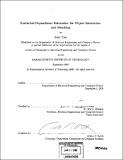Statistical dependence estimation for object interaction and matching
Author(s)
Tieu, Kinh H. (Kinh Han), 1976-
DownloadFull printable version (10.38Mb)
Other Contributors
Massachusetts Institute of Technology. Dept. of Electrical Engineering and Computer Science.
Advisor
W. Eric L. Grimson.
Terms of use
Metadata
Show full item recordAbstract
This dissertation shows how statistical dependence estimation underlies two key problems in visual surveillance and wide-area tracking. The first problem is to detect and describe interactions between moving objects. The goal is to measure the influence objects exert on one another. The second problem is to match objects between non-overlapping cameras. There, the goal is to pair the departures in one camera with the arrivals in a different camera so that the resulting distribution of relationships best models the data. Both problems have become important for scaling up surveillance systems to larger areas and expanding the monitoring to more interesting behaviors. We show how statistical dependence estimation generalizes previous work and may have applications in other areas. The two problems represent different applications of our thesis that statistical dependence estimation underlies the learning of the structure of probabilistic models. First, we analyze the relationship between Bayesian, information-theoretic, and classical statistical methods for statistical dependence estimation. Then, we apply these ideas to formulate object interaction in terms of dependency structure model selection. (cont.) We describe experiments on simulated and real interaction data to validate our approach. Second, we formulate the matching problem in terms of maximizing statistical dependence. This allows us to generalize previous work on matching, and we show improved results on simulated and real data for non-overlapping cameras. We also prove an intractability result on exact maximally dependent matching.
Description
Thesis (Ph. D.)--Massachusetts Institute of Technology, Dept. of Electrical Engineering and Computer Science, 2006. Includes bibliographical references (p. 97-103).
Date issued
2006Department
Massachusetts Institute of Technology. Department of Electrical Engineering and Computer SciencePublisher
Massachusetts Institute of Technology
Keywords
Electrical Engineering and Computer Science.